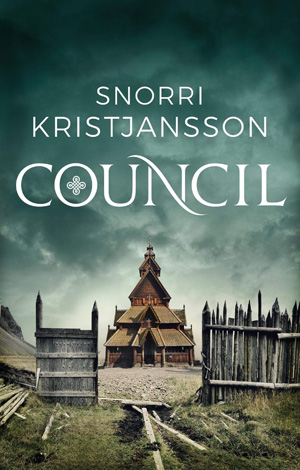
Written by Snorri Kristjansson — This author started off his writing career with the Valhalla saga, a series of Viking fantasy novels. The Helga Finssdottir series is also set in Viking times, around end of the 10th century and is full of subterfuge, pig-headed men and unscrupulous women.
Helga Finssdottir is the foster-daughter of Unnthor and Hildigunnur of Riverside, a Nordic homestead. Following the family get-together and ensuing murders in the first book, Kin, she has left the family and ends up in King Eirik’s mighty hall in Uppsala, Sweden.
Life has been good to Helga over the past three years. She has a home and a horse, and works as healer and herb seller on the outskirts of Uppsala. Despite her foster-mother’s advice not to rely on a man, she falls in love and lust with blond-haired Freysteinn, who occasionally rides into town and distracts her from her stable, single life.
This peaceful equilibrium is disrupted when King Eirik calls a trade council and vassals from across the realm arrive en masse in Uppsala. Although the council’s main purpose is to gather news and trade, the delegates are all vying for position, negotiating alliances, arguing, competing and, of course, wrestling. There is tension in the air, the constant possibility of violence, and when a delegation led by Jorunn, Hildigunnur’s outcast daughter and Helga’s enemy, arrives, the already volatile situation is further aggravated.
Soon the bodies start piling up. First a fair-skinned boy ends up dead in the river. He can’t be identified so Helga is summoned to scrutinise the body for clues, work out who he is and why he died, either through reason or using her ‘Norse witch’ abilities. She asks the body and runes to tell her its secrets, but both remain tight-lipped. When a second body, that of Alvar Dal, one of Jorunn’s men, is found at the bottom of a cliff a blood-price is demanded for the death and the boundaries of diplomacy are stretched to the extreme. Shortly after two more attacks take place and everyone in King Eirik’s court is eyed as a potential suspect.
The responsibility falls on Helga to unmask the murderer. But will she be able to see the truth when her judgement is clouded by her history, warped sense of admiration for Jorunn and her love for brawny Freysteinn? With every murder Helga examines the wounds. Most of these examinations don’t lead to concrete answers, not even if the runes are consulted. It’s clear that Helga relies more on the runes and gods than common sense and it takes some time before she puts two and two together. This apparent lack of insight casts some doubt on her stature as the town’s wise woman. At times it feels as if Helga is merely a bystander instead of the person tasked to solve a murder.
Much of the plot is driven by female characters making the decisions in a male-dominated world. Men fight with the sword, women fight with wit and cunning. Ironically Jorunn is by far the strongest female character in Council and much like Helga, one can’t help but admire her for her cutthroat approach to diplomacy and life in general. Unfortunately Helga seems rather weak next to her adopted sister.
Matters at the council are put on hold when King Eirik’s cousin, Styrbjorn the Strong, leader of the Jomsvikings, launches an attack on the town and a battle ensues. The king decides to send Jorunn and her men, as well as Helga, to Denmark to spy on King Harald Bluetooth. When they reach Denmark events take a turn for the worse and Helga finds herself in a tight spot which might prove difficult to escape from.
Although this is the second of the series it provides the necessary background by referencing previous events and characters needed to understand some of the plot details. Council’s depiction of Viking life, practices and Norse mythology is its strength, but at times we are given almost too much detail. For example, there are multiple references to Helga’s horse, whether it’s her conversations with it or grooming and riding it. These details prevent the story from building up momentum and when it eventually does, we’re through most of the book without any clearer idea of who the murderer is. Council also ends rather abruptly, leaving an open ending and the definite possibility for a third in the Helga Finssdottir series.
Council brings something to the table which will appeal to readers of different genres. If you don’t like historical fiction, you’ll be swayed by the crime twist and if you don’t like crime, the Viking setting may keep you reading. Either way it’s a battle won… eventually.
Read our review of Kin, the first of the Helga Finssdottir series.
Quercus Publishing
Print/Kindle
£7.49
CFL Rating: 3 Stars










